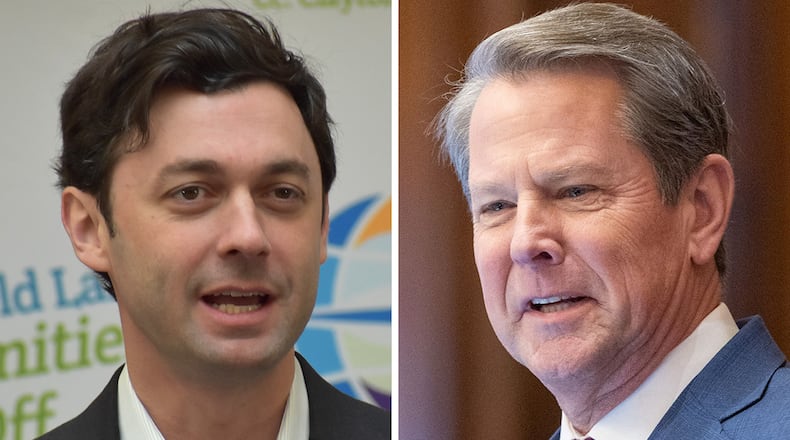The town of Bainbridge will become the latest backdrop of an ongoing battle over the Biden administration’s federal spending initiatives Tuesday when Gov. Brian Kemp and U.S. Sen. Jon Ossoff arrive to promote dueling agendas.
Each plans to tout a new $800 million factory that Anovion Technologies announced in May to join the growing ranks of battery suppliers for electric vehicles in Georgia.
Anovion plans to build the largest synthetic graphite production facility in North America, generating 400 jobs for Bainbridge, a city of roughly 25,000 people in the southwest corner of the state.
The development — the latest in a parade of electric-vehicle suppliers and manufacturers to expand in Georgia — also revives a long-running political argument over the policies that jump-started the state’s booming green energy industry.
It’s an ongoing debate that both parties see as crucial to next year’s race for the White House and also the 2026 midterm, when Ossoff stands for reelection — and Kemp could be his biggest threat to a second term.
The governor, a conservative Republican, has framed the expansion as a byproduct of the business-friendly, low-tax policies fostered at the state level by successive GOP administrations, along with an aggressive approach to incentives and well-trained workforce.
What he has steadfastly refused to credit is a climate and health measure known as the federal Inflation Reduction Act that Congress passed over unanimous GOP objection.
The Biden-approved law includes billions of dollars to promote green energy, and several recently announced projects in Georgia will directly benefit from the new federal spending. Kemp sees it as government interference in a free-market economy.
“We either need to do one of two things,” he said recently. “You need to give them to everybody or take them away — just make the playing field completely even.”
He has also taken aim at a more nuanced part of the law, saying it “punished” Hyundai because vehicles assembled overseas wouldn’t qualify for the lucrative perks — so the South Korean automaker won’t be able to receive those benefits until 2025, when its Georgia plant is up and running.
(Hyundai recently reported that it is on track to open its factory near Savannah months ahead of schedule, which state and company leaders partially credit to the rush to qualify for the federal incentives.)
Ossoff, who won office in 2021 with a promise to support an EV renaissance, has not shied away from linking the crush of new jobs directly to Biden’s health and climate package.
The Democrat repeatedly credits the law with spurring new investments in Georgia, and he notes that the solar manufacturer Qcells linked a $2.5 billion expansion it announced earlier this year to Biden’s package. Anovion, too, can tap an array of tax breaks for “critical minerals” projects under the law.
Credit: Georgia Department of Economic Development
Credit: Georgia Department of Economic Development
But Ossoff also is keen to invoke another Biden-backed initiative: the $1 trillion bipartisan infrastructure law that passed despite the opposition from every member of Georgia’s GOP delegation to Congress, who cast it as a wasteful gusher of excessive spending.
In October, Anovion was awarded a $117 million federal grant under the law to jolt domestic battery manufacturing, part of a broader effort to create a domestic supply chain for the future of auto travel while lessening dependence on China.
The policy fight will have consequential implications for the state’s economy. Few states have benefited more than Georgia from the surge of jobs tied to clean energy and green-powered mobility.
Since 2020, EV makers and their suppliers have announced more than 40 projects accounting for nearly 30,000 jobs, headlined by massive Hyundai and Rivian plants that account for a combined $10.5 billion investment.
Ossoff framed the Anovion project as the latest in a string of high-tech developments that should draw applause from both sides of the aisle.
“A huge new plant is getting built in Bainbridge thanks to manufacturing incentives in the Bipartisan Infrastructure Law and the IRA,” said Ossoff. “This is more good news for Georgia and we should be celebrating it together.”
About the Author
The Latest
Featured






